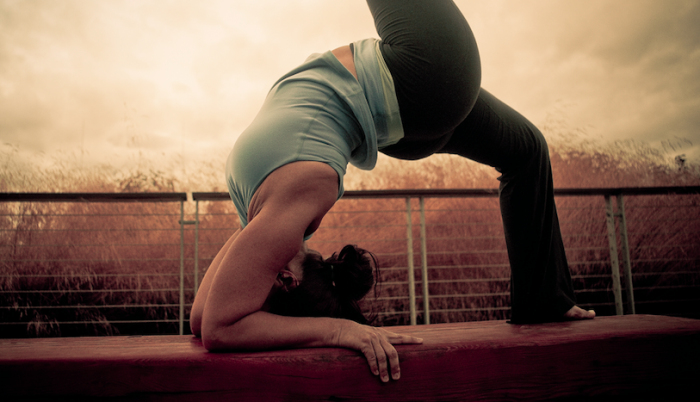Elephant’s Continually-updating Coronavirus Diary. ~ Waylon
~
Since the COVID-19 pandemic has disrupted life as we know it, you may miss going to your local yoga studio to breathe, sweat, and lie down in savasana with dozens of other fit, sweaty bodies in the same room as you.
I don’t blame you. That stuff feels pretty good. However, I also think the pandemic is going to seriously advance your yoga practice if you surrender to it.
Some examples:
1. Lockdown is the new version of staying at an ashram.
If you haven’t been to an ashram yet, let me tell you what it’s like. Every ashram I’ve stayed at has involved getting locked into the property. Sure, I paid to be locked in there, and I’m sure I could have busted out if I really wanted to. Perhaps if I got sick of the plain food, the same exact sequence of yoga poses every day, getting assigned a job pouring tea as my service act, meditating, and chanting at the same time every day, or having to eat with my right hand as a left-handed person due to cultural practices—maybe if I got sick of any of this, I would have demanded my money back and busted out of there on the next taxi ride I could organize, but I didn’t.
In fact, I loved being restricted; loved having the tight boundaries to bump up against so I could see myself a little more clearly. And I loved the monotony of it because somehow I could see how it is possible to change a life simply by doing the same set of things over and over again. Habit change is not rocket science. It’s repetition.
Are you noticing what you are repeating? Write down your daily routine and some assumptions about how each component of your routine will affect your life.
2. Distancing measures are forcing you to practice pratyahara, or withdrawing the senses inward.
Pratyahara is the yogic practice meaning the “withdrawal of the food”—sensory food. It’s basically step one when a person begins to meditate. You just close your eyes and cut yourself off from the outside world, just like we are doing with our bodies now by sheltering in place, maintaining space, and covering our faces.
I know you didn’t want this pandemic to happen. None of us did, but now that we’re here, we can focus more inwardly. Whether you are walking around in public with your face mask on or sitting at home wishing you could step inside a building other than your home or the supermarket, you now have an opportunity to turn the flashlight back at yourself as you tune out the outside world of the senses.
You can’t actually escape from your life now, which is essentially what going to the ashram did for me and I’m guessing millions of others in history. You have to live in your house, along with whomever and whatever is going on in there. You are in charge of setting your own restrictions, boundaries, and allowances now—on top of the ones the government is placing upon you.
Do you trust your ability to set up new lines of latitude and longitude for yourself? Write down what you notice is really essential for your life and what you might be better off living without.
3. Being lonely and isolated will force you to practice aparigraha, or nongrasping.
Our minds seem to have claws in them, which want to reach from their center and grab a hold of the outside world—objects, foods, places, people. It’s easier to grasp for content and consumables than to sit, alone, inside an emotionally blocked, overstimulated, overworked, weirdly nourished, and sometimes wildly ignored body.
However, if you let go of your grasping, you’ll find out where all the hurts are that are causing you to try to eat the universe. And if you look at those hurts long enough and let them pass through you, you will find the deep joy that is sustained by nothing rather than everything. Once you’ve found that, you are free.
The spiritual payoff:
Now is the perfect time to study the disembodied tentacles of your workaholic busyness or other modern addictions and trace them right back into the center of your being—to the hurts, the wounds, and the yearnings covered up long ago by a killer drug called distraction.
So if you miss going to your yoga studio and are worried that your yoga practice isn’t advancing any longer, this is the perfect time to ask yourself, “Why did I start doing yoga in the first place?”
Figure that out, and boom, you’ll automatically be advanced to the next level.
~











Read 1 comment and reply